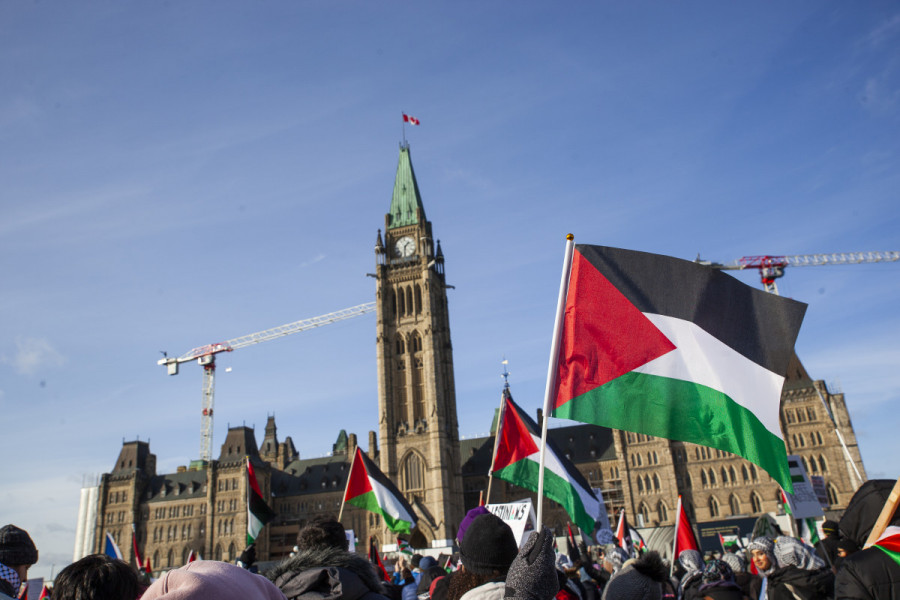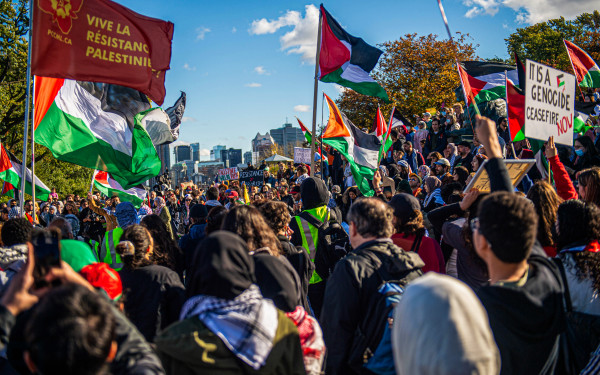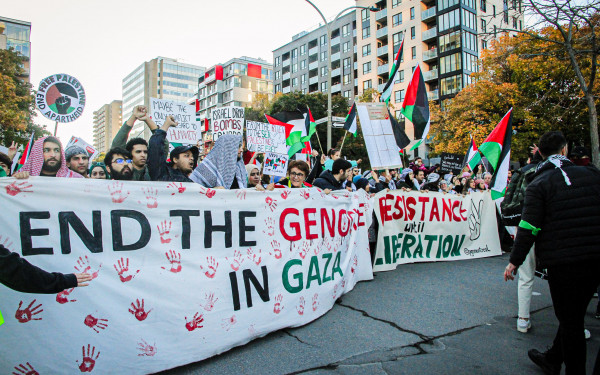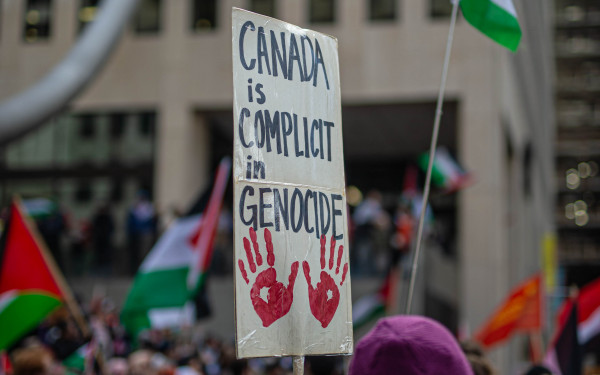Canada falls short on Palestinian refugee aid
Experts say Canada’s lacklustre approach to Palestinian refugees is unacceptable
Three months after the continued genocide of Palestinian people in Gaza, Canada announced a special measures residency program for Palestinians. It has been met with criticism from experts.
The temporary resident pathway program, which was put forth by Immigration, Refugee, and Citizenship Canada (IRCC) on Jan. 9, allows a capped total of 1,000 applicants who must be sponsored by a Canadian family member.
“Canada should be using all leverage it has, not only to bring Canadians and their families to safety, but also in forcing an immediate ceasefire and an end to the violence,” said Michael Bueckert, vice president of Canadians for Justice and Peace in the Middle East (CJPME). “There is no question that Islamophobia plays a role [in Canada’s response], but more specifically, so does anti-Palestinian racism.”
For the 1,000 Palestinians eligible to apply for this special measures program, they will be granted three months of health coverage and the ability to apply for study permits, open work permits and language training, according to the Government of Canada’s website.
Beyond the low application cap, they are also met with a challenging application process. Canadians wishing to sponsor their Palestinian family members must first supply a notarized sworn statement of their ability to provide financial assistance for one year—a requirement never before published by IRCC. The form then requests the applicant to list all work since the age of 16, including names of supervisors, and to indicate any scars or injuries.
According to Kevin Gould, a human geographer and associate professor in geography planning and environment at Concordia, where he’s taught Postcolonial Geographies, the reasons for the measures for Palestinians seeking refuge in Canada—which have been described as lacklustre—are rooted in prejudice and that anti-Palestinian sentiment is motivating the arbitrary restrictions and lack of support.
Gould points out that many of the Palestinians in Gaza were already refugees from the Nakba in 1948, and are once again made vulnerable.
“After all this, Canada offers 1,000 spots, it is appalling,” said Gould. “Canada and other countries should be supporting Palestinians to continue living on their land in peace and with justice. If Canada was actually a defender of international human rights as it claims to be, this is what Canada would be standing for.”
In November 2015, four years into the ongoing war in Syria, Canada initiated Operation Syrian Refugees (OSR)—a program that welcomed 25,000 refugees in 100 days through non-governmental organizations, provincial governments, and private sponsorships. After Afghanistan saw the fall of Kabul in August 2021, Canada welcomed over 40,000 refugees through three different programs. Most recently, Canada created an uncapped visa program for Ukrainians following Russia's invasion in February 2022.
The Canadian government’s website states that the visa program will expire either when 1,000 visas have been received or after Jan. 9, 2025, the one-year mark of the program, whichever one comes first.
Since January 2024, Canada has processed 144 applications from Palestinians in Gaza, yet none have been finalized, according to an Al Jazeera article. Immigration Minister Marc Miller stated that if the volume of applicants exceeded 1,000, the Canadian government would be flexible.
"We want to get a sense of what that volume is and we will be flexible. You know, we don't have a sense of what the numbers are that we're dealing with. We're speculating," Miller said.
In an interview with the CBC, Miller also tried to justify the reasons for the amount of documents needed to apply for a visa, explaining that “These are details that we need. We do not know who these people are; they are not Canadians, they are not permanent residents.”
As of February 2024, over 1.5 million individuals are displaced within Gaza.
“It is evident that the arbitrary restrictions on this program have caused unnecessary harm and panic for Palestinian Canadians and their family members attempting to access safety,” Bueckert said.
With frequent electrical outages and little to no Internet service in Gaza, visa application processes grow more difficult, confusing and time-consuming.
The Canadian government requires Canadian-Palestinians to have a valid passport and biometrics, which refer to the unique characteristics of a person who can be used to identify them, such as fingerprints and a facial scan. Biometrics must be obtained at a Government of Canada-authorized visa centre. The closest centre to Gaza is in Cairo, Egypt. Due to Israeli restrictions over Palestinian travel, it is nearly impossible to leave the Gaza Strip.
If these expire in less than three years, their status as a temporary resident will end. This includes once they arrive in Canada. They are able to extend their status, but only before their passport and biometrics expire.
While they can reapply, the cost is not covered by the Canadian government.
Gould explained that once Canadian-Palestinians are accepted into Canada, they will be expected to apply for other family members to come to Canada.
“One of the critiques of these kinds of schemes is that it is the people, the Palestinians themselves, who will bear the cost of bringing additional family members in the future,” said Gould. “This is putting the burden of sponsoring refugees on people that can least afford it.”
Bueckert said that another barrier facing Palestinians is that Israel has significantly restricted the ability of Palestinians to leave, and has created dangerous conditions for evacuation.
The Canadian government’s website states that leaving Gaza is difficult and may not be possible due to entry and exit requirements set by “countries in the region.”
“Canada should be using all leverage it has, not only to bring Canadians and their families to safety, but also in forcing an immediate ceasefire and an end to the violence,” Bueckert said.
With limited aid and support from the Canadian government for Palestinian refugees, Canadian citizens and people across the globe have taken matters into their own hands.
Hundreds of GoFundMe campaigns are raising money to help Palestinians get out of Gaza.
One GoFundMe for Abdel-Rahman Kouta, a Canadian-Palestinian who was born in Ontario and moved to Palestine six years ago for his education, is trying to raise $150,000 USD to get himself, his wife and two daughters out of Gaza.
He has currently raised $61,201 USD.
It can cost between $5,000 to $10,000 per person to leave Gaza for Egypt. This is the average cost of bribing brokers to put their names on the list of people permitted to exit Gaza.
In the GoFundMe, Kouta stated that as he has no source of income, and thus the donations will help him pay for the expensive evacuation fees, food, clothes and accommodation.
“We lost everything we had, and I don't know how long it will take us to get to Canada and start over entirely from scratch,” his GoFundMe reads.
When asked why Canada may not be prioritizing support for Palestinian refugees, Bueckert stated that Islamophobia plays an obvious role, but more specifically so does anti-Palestinian racism.
“State racism is an important factor for understanding Canadian immigration policy and anti-Palestinian racism and Islamophobia,” Gould said. “It certainly seems relevant today when we ask ourselves why Canada is not welcoming refugees from Gaza.”
This article originally appeared in Volume 44, Issue 12, published March 19, 2024.






_2_600_375_90_s_c1.jpg)
